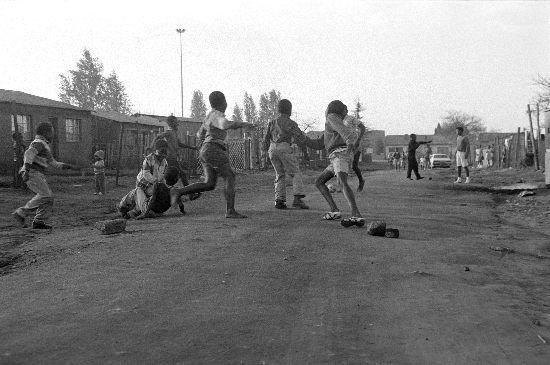Racial segregation in South African sport dates back to 1892, when the white-only Football Association of South Africa (FASA) was formed. Originally recognized by FIFA in 1952, FASA was suspended in 1961. This lasted until June 1976, when it was formally expelled after the Soweto Uprising drew attention to the ongoing impact of apartheid.
The sport has retained a positive legacy in promoting a platform for voicing views against racism in sport, as well as highlighting the role of sport in promoting societal values, including teamwork, friendly competition, sportsmanship and camaraderie. During the height of apartheid, enthusiasm for the game transcended state restrictions. The emergence of soccer heroes, including Ace Ntsoelengoe of the Kaizer Chiefs and Jomo Sono of the Orlando Pirates, defied attempts made to exclude black players from participation in international sports events.
In late December, 1985, the United Nations adopted the Convention against Apartheid in Sport, contributing to the step-up of international pressure against Botha's regime. In the same year, the emergence of the National Soccer League helped redefine the game in South Africa. By 1992, South Africa hosted its first official international soccer match against Cameroon.
After almost a decade of preparation, the World Cup in South Africa has highlighted the potential of the country to promote global goodwill; it has also amplified the need for further efforts to overcome the worst problems faced by South Africa - and the rest of the African continent. This includes the impact of globalization on developing countries, poverty, illiteracy and lack of access to housing and basic services. FIFA has initiated a global campaign aimed at drawing attention to the importance of education for all. 1GOAL emerged out of the global commitment to adhere to the United Nations Millennium Development Goals ensuring education for all children.
SAHA and our sporting history
SAHA has produced a number of products with content related to great sporting moments that reflect the significant role of sport in the history of South Africa. In addition, the Sunday Times Heritage Project website was established to provide users with the opportunity to learn more about South Africa's heritage.
One of South Africa's most legendary soccer teams, the Orlando Pirates, found its humble beginnings in the late 1930s when members of Orlando's boy's social club organised themselves into a football team, called the Orlando Pirates Boys Club. Soon, Bethuel Mokgosinyana became the president of the club, providing the team with its first soccer kit and name - 'Pirates.'
Visit the STHP memorial to Bethuel Mokgosinyana.
Happyboy Mgxaji, lightweight boxing champion from Mdantsane in the Eastern Cape, won the SA Junior Lightweight title in 1973, becoming a hero to generations of boxing fans. The Sunday Times Heritage Project commissioned a memorial for him at Sisa Dukashe Stadium in Mdantsane, where crowds had gathered to watch him perform.
Visit the STHP memorial to Happyboy Mgxali.
Basil D'Oliveira was an avid soccer player in his youth, but cricket remained his lifelong passion and profession. He became a symbol of resistance in South Africa's sporting history when he defied attempts by the South African government to keep him from playing for the English team set to tour South Africa in 1968.
Visit the STHP memorial to Basil D'Oliveira.
The stories of both the Orlando Pirates and Basil D'Oliveira are told in SAHA's publication, 'Great Lives: Pivotal Moments.'
Learn more about SAHA's publication, 'Great Lives: Pivotal Moments.'
Radio documentaries on the Orlando Pirates and Happyboy Mgxali are featured in 'Voices from our Past.'
Learn more about 'Voices from our Past' and hear the radio documentaries.









